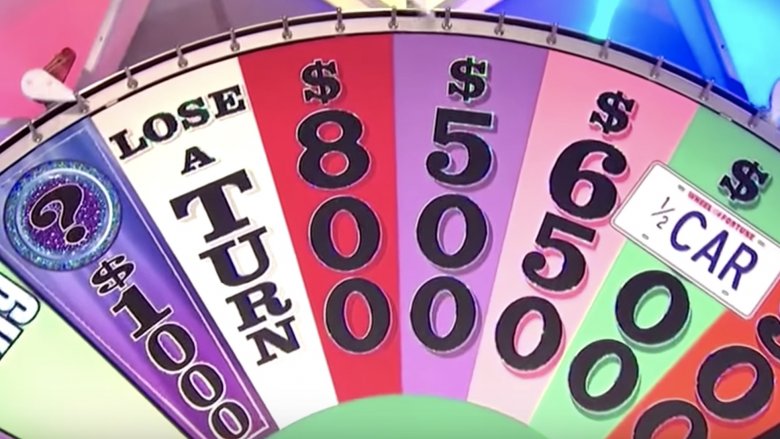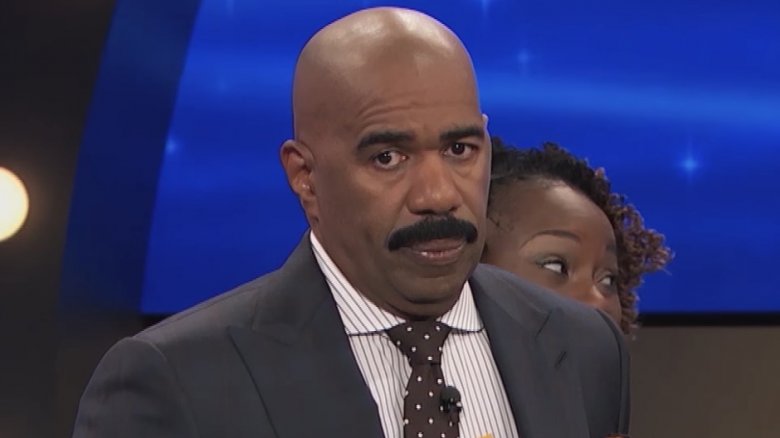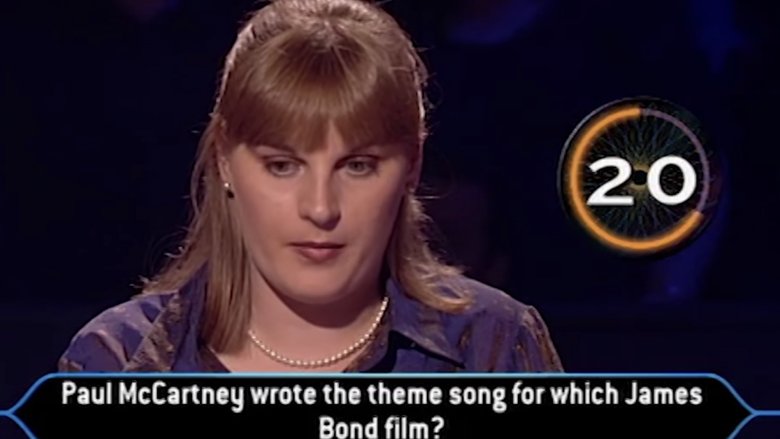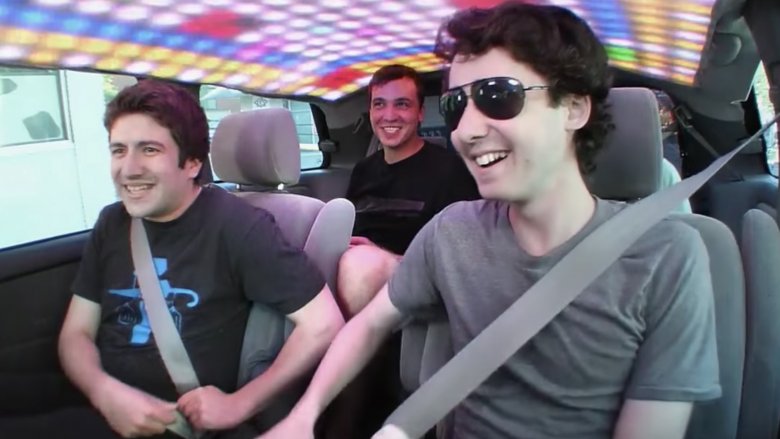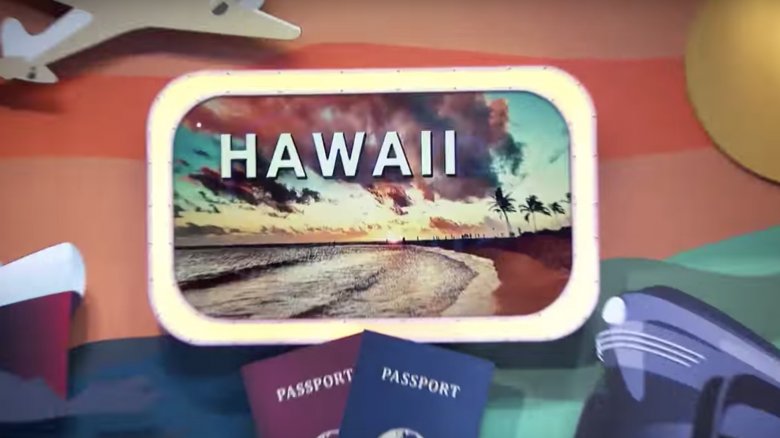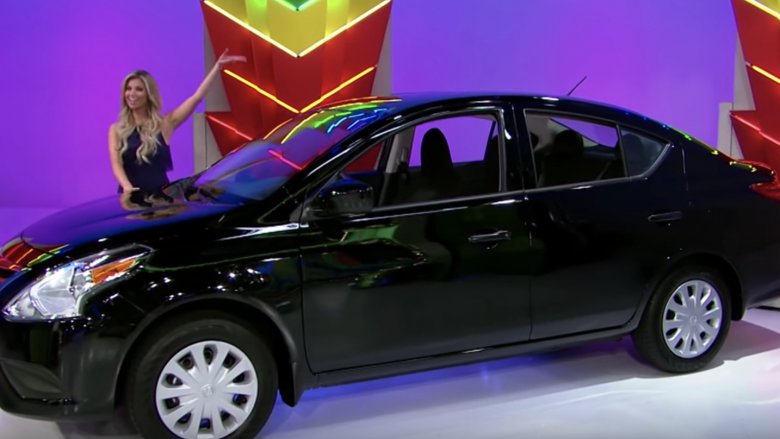Secrets Game Shows Don't Want You To Know
Game shows have entertained and thrilled audiences since the early days of television. It's irresistible to watch a regular Joe or Jane go on shows like Wheel of Fortune, The Price is Right, Let's Make a Deal, or Jeopardy! and use their skills and smarts to win fabulous cash and prizes. (Or, if they lose, parting gifts like Turtle Wax, Rice-a-Roni, and a copy of the home game.) Making a game show is a huge endeavor involving lots of people and moving parts to create all that TV magic day in and day out. Here's a look behind "Door Number Two" to see how they pull it off.
Things are much smaller than they appear on TV
A game show is an exciting, fast-paced, brightly-colored spectacle that lets viewers escape their lives for 30 minutes. The reality: it's all an illusion. Camera angles, lighting tricks, and other image-manipulation techniques are used to make things look a lot larger than they really are. A game show set, like the one used for Jeopardy!, is, according to one contestant "about half the size of a school gym." The studio audience that thunderously claps and cheers consists of, on average, about 100 people. That seemingly massive, iconic, titular wheel on Wheel of Fortune? It's only 6 feet wide, edge to edge.
Who are the 'judges'?
Game shows are full of temporarily high-stakes moments and tension thicker than Alex Trebek's mustache. No moment is more tense than when a contestant gives a response and, instead of hearing "correct" or "I'm sorry," hears that pregnant pause and then the game show host's imploring "Judges?" These game show judges remain obscured in the shadowy wings, never to appear on camera, which only enhances their mystery and might. Just who are these panels of judges who lord over game shows and are the ultimate authority as to the rightness or wrongness of an obtuse response? It's kind of a letdown: it's usually just a few employees of the show. For example, on Family Feud, the judges are a couple of executive producers. The tribunal of Jeopardy! judges consists of two writers and an executive producer. They're only human.
A serial killer and sex offender appeared on The Dating Game
The Dating Game was always kind of creepy. A woman (or a guy) would interview three dudes (or ladies) she (or he) couldn't see, and then based on their innuendo-laced responses, would pick one to take on a mini-vacation. (Then everyone revealed themselves and blew a kiss to the viewers at home. Good times.) But the show outdid its icky self when a man named Rodney Alcala appeared on the show in 1978. Jim Lange introduced Alcala thusly: "Bachelor No. 1 is a successful photographer who got his start when his father found him in the dark room at the age of 13, fully developed. Between takes you fight find him skydiving or motorcycling."
In reality, you might also find him engaged in his other hobby: committing unspeakably heinous crimes. In 2010, Alcala was convicted of multiple sexual assault and murder charges dating back to the '70s. Bachelorette Cheryl Bradshaw actually selected Alcala out of the (bachelor) lineup as her date. But when she got some one-on-one time with her mystery date backstage, she said she "started to feel ill," according to an Australian magazine. "He was acting really creepy." She never did go on that free date with Alcala, which was probably for the best. The former game show panelist now sits on another, less appealing line-up: California's death row.
The unseemly origins of Double Dare's 'gak'
There were a lot of things on the kids' game show Double Dare that, from an adult point-of-view seem risqué in retrospect. Creators had to know that terms like "physical challenge," "super-sloppy," and "gak" sounded wrong, right? As it turns out, the staff of DD (hey, there's another one) knew exactly what they were doing. The slime employed on Double Dare was nicknamed "gak," which led to a successful spinoff line of jarred Gak that kids could buy and use to torment their siblings. That's much different than another kind of gak they could also enjoy at the time. In a 2013 interview with the Huffington Post, Double Dare host Marc Summers revealed that in Philadelphia, where Double Dare shot its early episodes, gak was "a street term for heroin." (And as you suspected, there was plenty of other wackiness happening on set, too.)
The panelists on Match Game were drunk
Has a game show ever seemed more fun to be a part of than '70s-era Match Game? The panel of six B-level celebrities (which often included Broadway actor Charles Nelson Reilly, TV actress Brett Somers, and future Family Feud host Richard Dawson) teased each other, laughed uproariously, and gave wild responses to the game's questions, all while host Gene Rayburn tried in vain to steer things back on course. That's because it's hard to corral half a dozen drunk people.
Like most game shows, a week's worth of Match Game episodes (five) were shot in one day: shoot two, take a break, shoot three more. "After the second show we went to lunch, and there was this big flask and there would be people who would imbibe," frequent panelist Jimmie Walker told The Los Angeles Times for a 2013 article on the show. "It was a vodka group," panelist Marcia Wallace added. Numerous Match Game staffers confirmed in the documentary The Real Match Game Story: Behind the Blank that the shows filmed after the meal break were a bit "looser" than the ones filmed before. In other words, on the Monday episodes of Match Game, the panelists are relatively straight-laced ... but on some of the Friday ones, they're hammered.
Who wants to Google for a millionaire?
How lucky it is for a smart person to get onto Who Wants to be a Millionaire? and finally make some money off their intelligence. And then, how lucky it is when they aren't sure about an answer and use their (now defunct) "Phone-a-Friend" option to contact a relative or friend who does know the correct response. However, that friend might not be smart so much as they are quick with Google. "Phone-a-Friend" friends got 30 seconds to respond to the question, which is plenty of time for a little online research. According to a Reddit user named "Toastwaver" who said he was picked as a lifeline for a contestant on Millionaire, their official preparation from the show's producers included "no mention about Googling. In other words, it was understood that using the 30-second window to Google the question would be acceptable." Hey, if they can't see you, it's not really cheating, right?
The surprised contestants on Cash Cab aren't that surprised
Part of the fun of Cash Cab is the sneak attack: Contestants get into a seemingly normal cab (albeit a suspiciously large and clean one) and then get hit with the flashing lights. They're delighted, they play the game, they win. What a lovely surprise and a great story for those contestants to tell for the rest of their lives. Yeah, it's a bit more complicated than that. Producers can't and wouldn't just grab anybody off the street — what if they were really shy on camera, or were too dumb to answer the questions, or didn't want to be on TV? That would be a tremendous waste of time and money.
So, on the New York-based Cash Cab, for example, production coordinators approached potential contestants in well-populated New York City spots, like Union Square. Instead of saying they worked for Cash Cab, they said they were in search of participants for some other vaguely described, fictional reality show. A former contestant told TV.com that a production coordinator approached him at the Union Square Barnes & Noble about a travel show. His answers to the vetting questions were apparently so good that a few weeks later he got a call from the coordinator of the fake show (supposedly titled "When in Rome") telling him he'd been picked to host the New York City episode. He was given a time and place to meet up with a transport van, and it turned out to be the Cash Cab.
There are totally legal ways to cheat
If you discover some nefarious method by which to cheat on a game show, you're probably going to get caught. But there are ways to beat the system — all it takes is some homework. In 2008, a Price is Right superfan named Terry Kneiss scored two tickets to a taping and his name was called by announcer Rich Fields imploring him to "come on down!" to Contestant's Row. When asked to bid on a backyard smoker/grill combo, he got it exactly right: $1,175. He won his individual game and then managed to make it into the show's final round, the Showcase Showdown. His potential prizes included a trailer and a jukebox, and Kneiss bid $23,743. Then host Drew Carrey revealed the actual total: $23,743. "You got it on the nose," Carrey coldly stated, absolutely stunned. Per the rules of the game, Kneiss won both showcases, a value of $56,437 ... which he could have told you. How did he do it? For four months, Kneiss and his wife, Linda, recorded The Price is Right every day and reviewed the tapes. They quickly noticed that the show tended to reuse products as well as prices. The "actual retail price" was always revealed, and the Kneisses just memorized every item's value.
Prize values aren't always what they seem
It's good that Kneiss memorized the Price is Right-stated cost of those items instead of, say, going to stores or travel agencies to determine what they cost. That's because game shows can inflate the stated values of all those prizes and trips. The number is an estimate, used as the figure to calculate the taxes owed. If a trip to Hong Kong costs, say, $4,254, that includes the cost of the included hotels during their peak season, according to game show prize coordinator Adam Nedeff. Buried in the mountain of paperwork winning contestants sign is a document telling them they have 365 days following their episode's broadcast date to redeem their prize. That wide time gap can also lead to a price that's different than the one stated on TV — it's going to be much lower during non-peak season, for example.
When you win a car, it's not the car on the show
While The Price is Right often awards exotic and fabulous vacations, there's nothing more exciting than when a contestant wins, as revealed by the show's announcer, "A NEW CAR!" Except that they don't get to keep that exact car. That one is just a stage prop provided by the car company/show sponsor. According to an AV Club interview with former contestant Andrea Schwartz, "You don't just drive off the backlot with the car like I thought the entire time I was growing up." The show connected her with a Mazda dealer near the show's Los Angeles-area studio, who then shipped her Mazda 2 to a dealer near where she lived in Nevada. Another downside about winning big on The Price is Right: The show requires contestants to pay California state income tax on their prize right then and there, immediately after they've won. To get her not-quite-free car, Schwartz had to fork over some of her savings along with the money she'd won minutes before playing Plinko.
